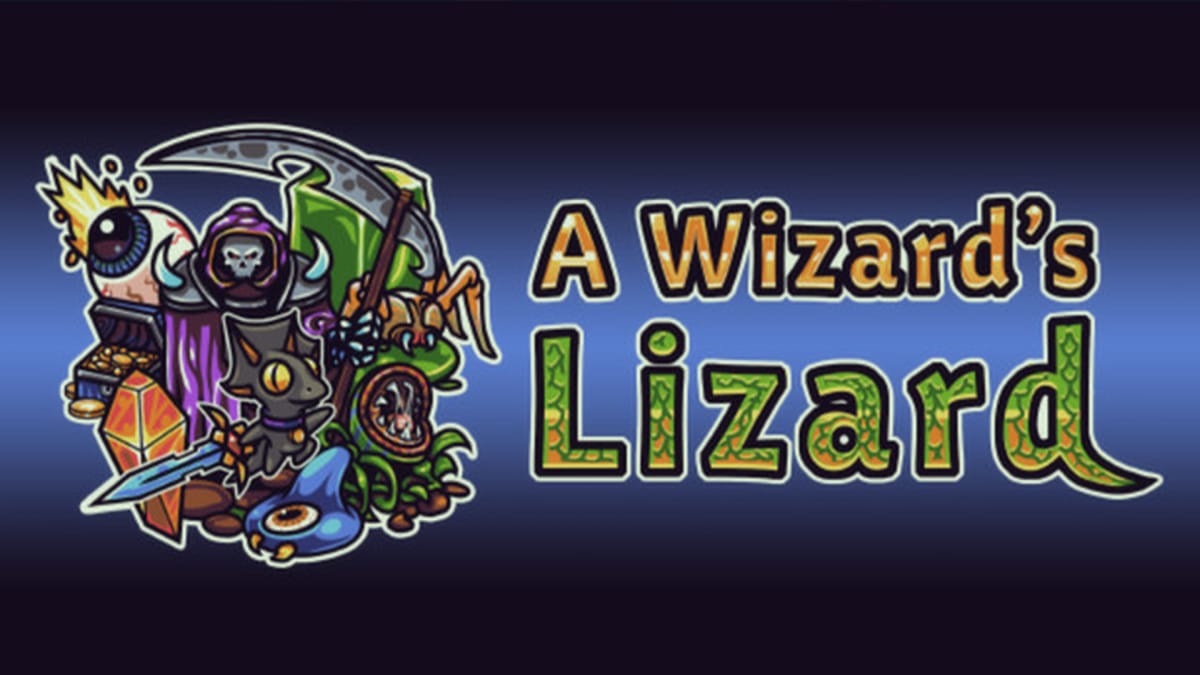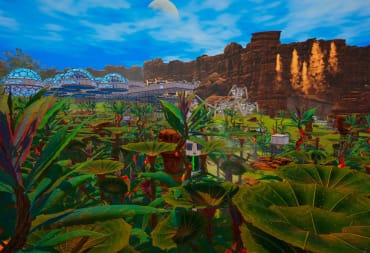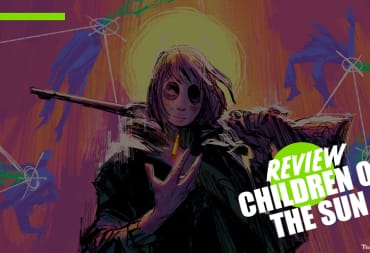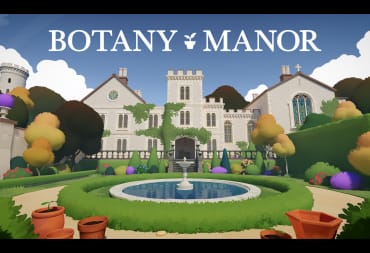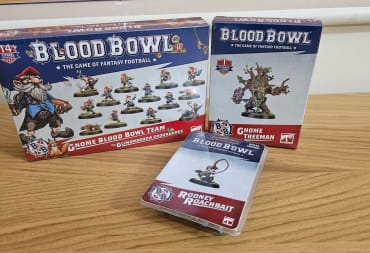At first glance, A Wizard's Lizard seems overtly similar to games that have come before it. The most obvious parallel here is to the Binding of Isaac, a fantastic roguelike that mixed together the original Legend of Zelda, grossness, the Old Testament, and a twin-stick shooter. However, A Wizard's Lizard is a fine example of taking a known template and applying a single twist that makes the experience rather unique. The inspirations behind this game are clear, but there is enough originality to make this another fun game in the same subgenre as Isaac rather than an imitator. It's not the most substantial or interesting roguelike you will play, but it's fun enough to merit a recommendation. Here's our A Wizard's Lizard review.
A Wizard's Lizard - Gameplay
Like the Binding of Isaac, A Wizard's Lizard is a top-down dungeon crawler. You make your way through rooms of enemies in a layout that is very much like the dungeons in the original Legend of Zelda and fight a number of bosses. What you come across is always randomly generated, but there is a persistence to each of the game's dungeons in terms of enemy types you will encounter and bonus things you will find.
Unlike the Binding of Isaac, A Wizard's Lizard has native controller support. Plug in a 360 gamepad and the game will recognize it and you can play away happily. This is great, as the game is set up as a dual-stick shooter (a genre that benefits greatly from having dual sticks). On a pure gameplay level, A Wizard's Lizard is really fun. There aren't as many variables as in some other roguelikes, but the core combat feels really good and controls excellently. Combat consists of throwing out infinite swords, axes, poles, or other weaponry, in the direction you push the right stick. There isn't a huge amount of weapon variety, but there's enough for you to stumble upon new things and enough for you to experiment with different tools. The key to this is that weapons feel satisfyingly different, you will discover whether you prefer the feel of a dagger or a spear, and this enables you to play the game in a way that suits your own style - which is always a nice touch.
A Wizard's Lizard - Items
Another key part of A Wizard's Lizard is the items, and though the offering isn't as impressive as in other roguelikes, there is some inventive stuff. One impressive thing the game does is use items to layer on basic mechanics to the experience in a natural way. Two key examples of these are an abacus and a monster manual; the first allows you to see damage numbers, and the latter displays enemy life bars. Hiding these tools behind items is actually a really clever idea, as it makes you realize how useful they can be. Also, the silly touch of tying them to in-game items adds to the charm of the game. It sounds like an odd point to make, but making damage numbers something you can achieve rather than something you just select makes it way more meaningful. It seems like a restriction but it's actually a neat way of adding a touch more complexity as you go along or just of items giving useful assists to the players.
Another interesting part of A Wizard's Lizard is its approach to death. The story of the game is linked directly to this issue, you are a lizard (you belong to a wizard), and your owner has been taken by death himself. Your job - of course - is to save him. This involves fighting across our mortal realm, as well as delving into the world of the dead. In gameplay terms what this means is that death is not the end, as dying in the normal world merely transports you into the underworld.
On a surface level, this is a second chance mechanic. Roguelikes are known for their punishing difficulty, and a large part of this comes from permadeath. When you die, you die, no second chances. You messed up, and now you start again from the beginning. Though it may not seem like it, this is still the case in A Wizard's Living. When you do actually die, you properly die. No retries; straight back to the start. Surviving your first death isn't a second life; it's an integral game mechanic that allows the game to be more forgiving but doesn't force it to be so.
A Wizard's Lizard - Parallel Realms
When you die, you come back to life in a parallel realm, one where you face different challenges. It's a world that is always bubbling away under the surface but one you can only interact with post-death. To a great extent, dying in A Wizard's Lizard actually makes things harder, as you now have more foes to deal with. When you play through the game, you will notice that killing a conventional enemy causes a ghost to walk around the screen, the ghost can do nothing to you, and you can do nothing to it, but this is only the case in the mortal realm. After you die in the normal world, you become a ghost, meaning that enemy ghosts suddenly become a threat. However, still-alive enemies are also a threat, putting you in a more challenging situation. Killing a lot of enemies while alive can cause more trouble for you when you are dead, and because you have to kill all enemies in a room to progress, you can get into a lot of sticky situations.
This consequence incentivizes you to stay alive, making death something you want to avoid rather than a crutch to lean on. This mechanic also makes the game far more fun and interesting than it would otherwise be. The two realms interact smartly with one another, and there are definite advantages to being in one over the other at different points. It's a mechanic that opens up a lot of different opportunities and is one that the game takes great advantage of. When you die as a ghost, the game is over, but there is an opportunity to be resurrected (with half health) by occult stars on the floor in dungeons. These stars are rare enough to make the consequence of your first death meaningful, but their availability does add to the experience. This ability to fluctuate between life and death, to have two different experiences and two worlds that impact on one another, adds a lot to the game. It's a unique mechanic that gives the game its own identity, but more importantly, it's a very fun mechanic that is well utilized by the game.
A Wizard's Lizard - Forgiving
A Wizard's Lizard is more forgiving and perhaps less interesting than other Roguelikes. On a basic level, it's just not as difficult. This actually works in the games favour though, as you are able to make more of a dent into it early on and feel rewarded straight away. It's a fun game to play, and it is easier than games like the Binding of Isaac doesn't detract from this. What does detract from this is that it isn't as imaginative or as interesting. It's a fun little game, but it doesn't feel as substantial as its contemporaries. There aren't as many game-altering items or crazy secrets here.
This means that it lacks some of the sense of discovery, and the sheer appeal of it being different every time. There's less to A Wizard's Lizard than other roguelikes, but what's there is still fun. Enemies are fun to fight, and there's a bunch of them, but they aren't hugely impressive. The bosses are fun, but the first few aren't very taxing, and the fights are rather basic. All of a Wizard's Lizard is fun, but it feels stripped down compared to other games in its genre, especially the Binding of Isaac. This also applies to the game's art. The game looks fine, but it's not very interesting looking. It's a generic art style that does nothing to elevate the game further.
A Wizard's Lizard - Undead Mechanics
A Wizard's Lizard does carry some appeal that games like Isaac don't, though. This comes from the great dead/undead mechanic but also from the game's persistence. There is a level of carryover in every run that makes you feel like you are always making progress and that there's more to do than just try and complete the game time and time again. Isaac gets round this potential pitfall with crazy amounts of content, but A Wizard's Lizard doesn't have that to fall back on. To stop things from getting stale, A Wizard's Lizard uses persistence. Every time you defeat an enemy or find a new item, it appears in your hub world, in a museum. The hub world is a starting area that you are sent back to after failing your quest. It contains a number of things, but the important parts are a shop, a money chest, and shortcuts. Shortcuts are opened by defeating bosses - for example, if you beat the second dungeon boss a number of times, you can start from that dungeon instead of from the beginning.
This is a forgiving touch, but it's something that works for the game. Playthroughs aren't that varied, but the progression is fun and rewarding. This unlock eases progression but is still something you have to earn, making it work as an appropriate reward. The money chest is another good touch, your starting gold increases with every NPC you save from a dungeon, meaning that you can feel like a run is worthwhile even if you die. These touches help the game to get around problems it could have, and they suit the game really nicely. It is a more accessible roguelike, but it's still fun to play due to some smart mechanics and great core gameplay.
The Verdict
A Wizard's Lizard is rather simple, but it's really endearing. It's not a revelation, but there are some smart ideas here which work really well. It has its problems and detractions, but its design conveys a real understanding of what kind of game it is, and this works wonders for it. It's the kind of game you will want to keep playing, and it does a good job (through persistence) of encouraging this even when a lack of variety can sap this feeling. It controls great, and its accessibility only adds to its charm. It's a fun little game that is well worth your time and money. Don't expect anything special or substantial, but do expect a good time.
Review Summary
Have a tip, or want to point out something we missed? Leave a Comment or e-mail us at tips@techraptor.net
